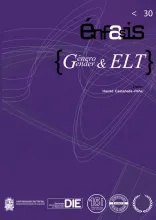
After facing so many unfair social situations throughout my life in the news and my immediate context, I started wondering about the roots of such social problems. With years of learning, I realized about the importance of exploring how power operates in society. I then focused my research on the traditional presence of power imbalances in the realm of gender and how heteronormativity permeates the learning of a foreign language (Castañeda-Peña, 2008).
In fact, “when we try to understand masculine domination, we must investigate the modes of thought which result from domination”. (Bourdieu, 2001, pp. 5) In other words, when we understand how language encloses a patriarchal discourse, we can also understand other forms of colonial domination and fight them from a de-colonial stance. Hence, the Third Space of gendered subjectivity emerges as an alternative to such domination.
This study was prompted by my seeing that some of my students assumed that men were generally the best in the class. When, during an intermediate English class, I showed the class an example of a well-written essay, one of the boys said, “He is a really good writer” and I said, “Yes, she is really good”. I thought it was only a mistake, until another boy repeated, “Yes, he is a good writer”. This reminded me of Butler’s concept of hegemonic gender performativity (1988), which generally attributes success to men.